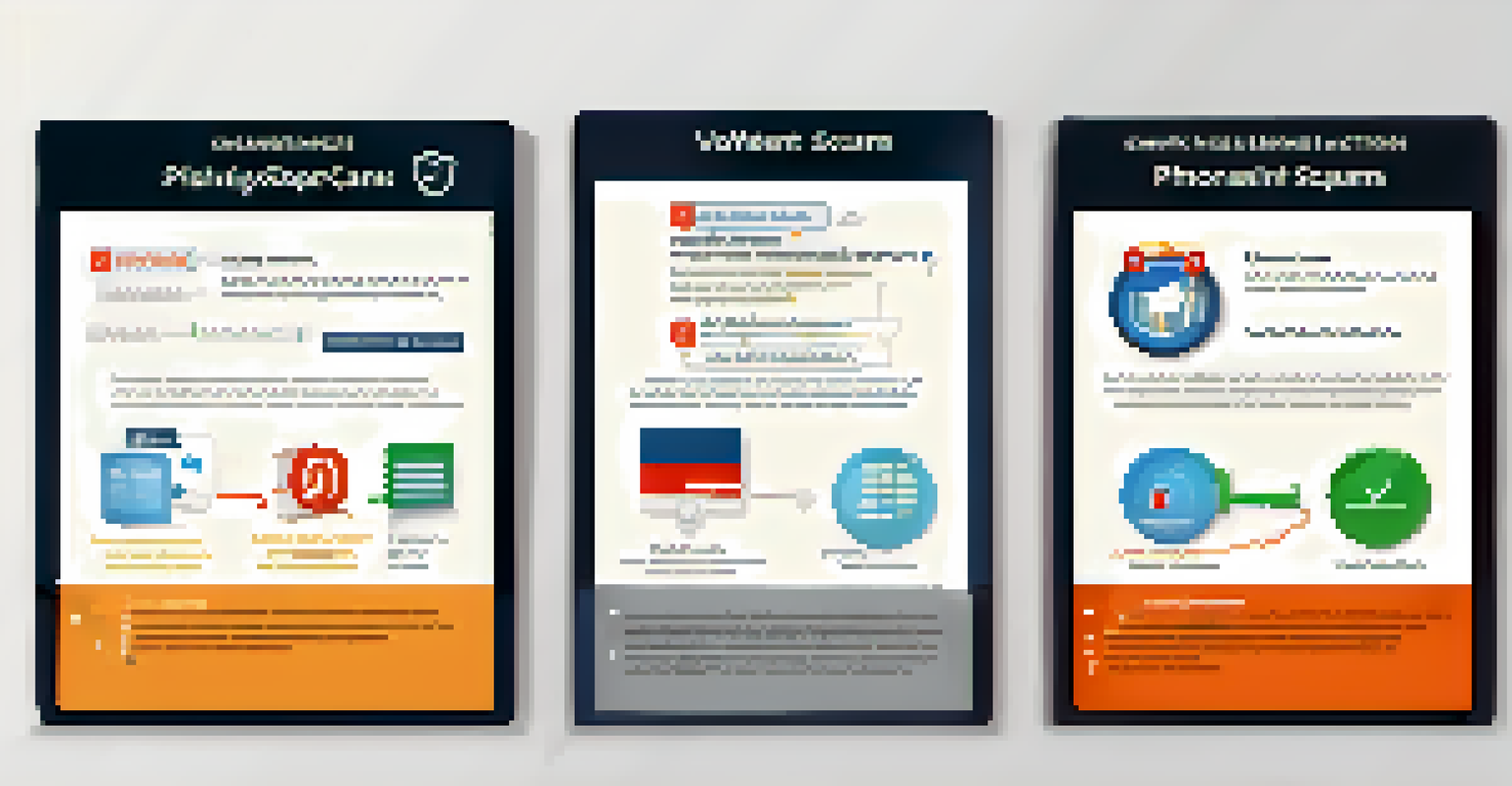Recognizing Phishing Scams in Cryptocurrency Platforms

Understanding Phishing Scams in Cryptocurrency
Phishing scams are deceptive attempts to obtain sensitive information by masquerading as a trustworthy entity. In the world of cryptocurrency, these scams often target unsuspecting users by imitating popular exchanges or wallets. It’s crucial to recognize these scams to protect your investments and personal data.
The best way to protect yourself from phishing scams is to be aware of their existence and to remain vigilant about the information you share online.
These scams can take many forms, including fake websites, emails, or social media messages that ask for your login credentials or private keys. For instance, you might receive an email that looks like it’s from a legitimate exchange, urging you to verify your account by clicking on a link. This link could lead to a fraudulent site designed to steal your information.
By understanding how phishing works, you can more effectively safeguard your cryptocurrency assets. Always be cautious and verify sources before sharing any information, as it can save you from potentially losing your hard-earned funds.
Common Characteristics of Phishing Scams
Phishing scams often exhibit certain telltale signs that can help you identify them. Common characteristics include poor spelling and grammar, generic greetings, and urgent calls to action. For example, a scam email might start with 'Dear User' instead of addressing you by name, which can be a red flag.

Another common feature is the use of fake domain names that closely resemble real ones. A scam site might use a URL like 'bitc0in.com' instead of 'bitcoin.com,' making it easy to overlook the subtle difference. Always double-check the URL before entering any personal information.
Identify Phishing Scams
Recognizing the common characteristics of phishing scams, such as poor grammar and fake domains, is crucial for safeguarding your cryptocurrency assets.
Additionally, phishing attempts may create a sense of urgency, pressuring you to act quickly without thinking. If you receive a message that insists you must act immediately to avoid account suspension, take a step back and investigate before proceeding.
Recognizing Fake Cryptocurrency Platforms
When navigating the cryptocurrency landscape, spotting fake platforms is essential. Scammers often create sites that mimic legitimate exchanges but lack security features like HTTPS encryption. Always look for a secure connection before entering any sensitive information.
In the digital age, awareness is the first line of defense against cyber threats.
You should also investigate the platform’s social media presence and customer reviews. A lack of transparency, negative reviews, or an absence of social media engagement can indicate a fraudulent operation. Trustworthy exchanges typically have a robust online presence.
Furthermore, check for any regulatory compliance or licensing information on the platform. Legitimate exchanges will be transparent about their operations and adhere to local regulations, whereas scammers often hide such details.
The Role of Social Engineering in Phishing
Social engineering plays a significant role in phishing scams, as scammers manipulate victims into divulging confidential information. They exploit emotions like fear, curiosity, or excitement to prompt hasty decisions. For instance, you might be drawn in by a message claiming you’ve won a cryptocurrency giveaway.
Scammers often craft messages that reflect your interests or recent activities, making them seem more convincing. This tailored approach can make it difficult to discern genuine communication from fraudulent attempts. Be wary of unsolicited messages that require personal information.
Secure Your Accounts
Implementing strong, unique passwords and enabling two-factor authentication are essential steps to protect your cryptocurrency accounts from potential threats.
To counter social engineering tactics, it's essential to remain vigilant and skeptical. Always verify the identity of anyone asking for personal details, even if the message seems authentic. When in doubt, reach out directly to the company through official channels.
How to Secure Your Cryptocurrency Accounts
Securing your cryptocurrency accounts is paramount in the fight against phishing. Start by using strong, unique passwords for each of your accounts and consider employing a password manager to keep track of them. Strong passwords should combine letters, numbers, and symbols to enhance security.
Enable two-factor authentication (2FA) wherever possible. This adds an extra layer of protection by requiring a second form of identification, often via a smartphone app or text message, before granting access to your account. This means that even if a scammer obtains your password, they still need that second factor to get in.
Regularly monitor your accounts and transaction history for any suspicious activity. Promptly reporting unauthorized transactions can help mitigate the damage and alert your exchange to potential breaches.
Recognizing Red Flags in Communication
Being able to identify red flags in communication is vital for avoiding phishing scams. Pay attention to the tone and content of messages you receive regarding your cryptocurrency accounts. Messages that seem overly aggressive or insistent can be a warning sign.
Look out for requests for personal information, especially if they come unexpectedly. Legitimate companies rarely ask for sensitive information via email or direct messages. If you’re ever in doubt, reach out to the company through official channels to verify the request.
Report and Stay Informed
Reporting phishing attempts and engaging with reputable sources can help you stay updated on the latest threats in the cryptocurrency landscape.
Lastly, be cautious about clicking on links or downloading attachments from unknown sources. Instead of clicking directly, navigate to the website manually by typing the URL into your browser. This simple practice can help you avoid falling victim to a phishing scam.
Reporting Phishing Attempts and Staying Informed
If you encounter a phishing attempt, reporting it is critical to help others avoid becoming victims. Most cryptocurrency exchanges and platforms have dedicated channels for reporting scams, so be sure to utilize them. This not only helps protect you but also contributes to the broader community's safety.
Staying informed about the latest phishing tactics and scams is essential in the ever-evolving world of cryptocurrency. Engage with reputable sources, such as cybersecurity blogs or official exchange updates, to keep yourself educated on new threats.

Joining online forums or groups can also be beneficial. These communities often share experiences and tips on avoiding scams, creating a supportive environment that fosters awareness and security.